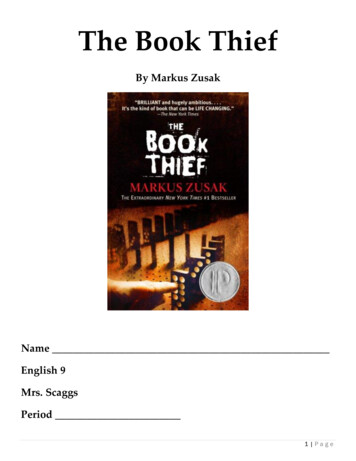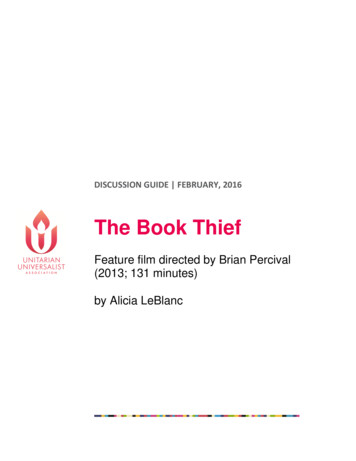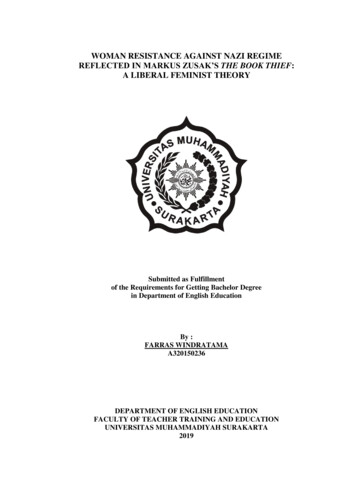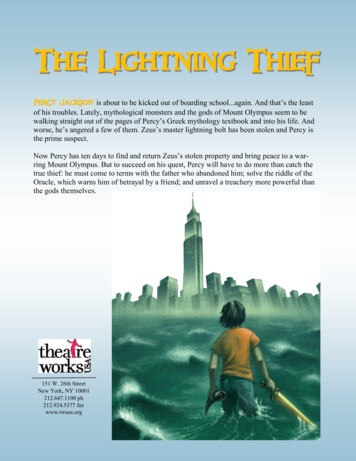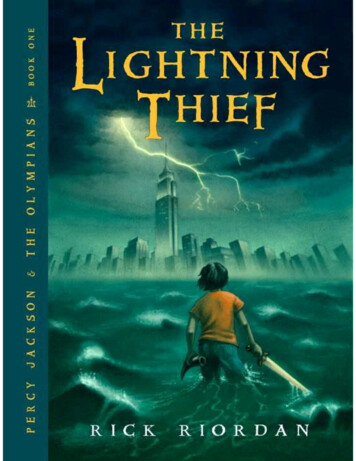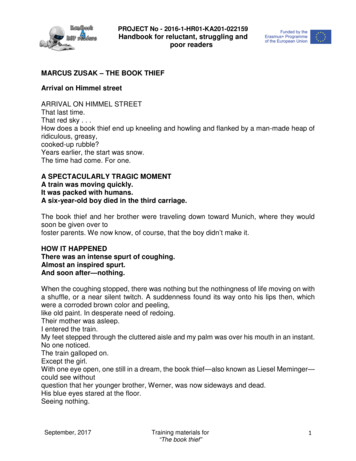
Transcription
PROJECT No - 2016-1-HR01-KA201-022159Handbook for reluctant, struggling andpoor readersMARCUS ZUSAK – THE BOOK THIEFArrival on Himmel streetARRIVAL ON HIMMEL STREETThat last time.That red sky . . .How does a book thief end up kneeling and howling and flanked by a man-made heap ofridiculous, greasy,cooked-up rubble?Years earlier, the start was snow.The time had come. For one.A SPECTACULARLY TRAGIC MOMENTA train was moving quickly.It was packed with humans.A six-year-old boy died in the third carriage.The book thief and her brother were traveling down toward Munich, where they wouldsoon be given over tofoster parents. We now know, of course, that the boy didn’t make it.HOW IT HAPPENEDThere was an intense spurt of coughing.Almost an inspired spurt.And soon after—nothing.When the coughing stopped, there was nothing but the nothingness of life moving on witha shuffle, or a near silent twitch. A suddenness found its way onto his lips then, whichwere a corroded brown color and peeling,like old paint. In desperate need of redoing.Their mother was asleep.I entered the train.My feet stepped through the cluttered aisle and my palm was over his mouth in an instant.No one noticed.The train galloped on.Except the girl.With one eye open, one still in a dream, the book thief—also known as Liesel Meminger—could see withoutquestion that her younger brother, Werner, was now sideways and dead.His blue eyes stared at the floor.Seeing nothing.September, 2017Training materials for“The book thief”1
PROJECT No - 2016-1-HR01-KA201-022159Handbook for reluctant, struggling andpoor readersPrior to waking up, the book thief was dreaming about the Führer, Adolf Hitler. In thedream, she was attendinga rally at which he spoke, looking at the skull-colored part in his hair and the perfect squareof his mustache.She was listening contentedly to the torrent of words spilling from his mouth. Hissentences glowed in the light.In a quieter moment, he actually crouched down and smiled at her. She returned the smileand said, “GutenTag, Herr Führer. Wie geht’s dir heut?” She hadn’t learned to speak too well, or even toread, as she had rarelyfrequented school. The reason for that she would find out in due course.Just as the Führer was about to reply, she woke up.It was January 1939. She was nine years old, soon to be ten.Her brother was dead.One eye open.One still in a dream.It would be better for a complete dream, I think, but I really have no control over that.The second eye jumped awake and she caught me out, no doubt about it. It was exactlywhen I knelt down andextracted his soul, holding it limply in my swollen arms. He warmed up soon after, butwhen I picked him uporiginally, the boy’s spirit was soft and cold, like ice cream. He started melting in my arms.Then warming upcompletely. Healing.For Liesel Meminger, there was the imprisoned stiffness of movement and the staggeredonslaught of thoughts.Es stimmt nicht. This isn’t happening. This isn’t happening.And the shaking.Why do they always shake them?Yes, I know, I know, I assume it has something to do with instinct. To stem the flow oftruth. Her heart at thatpoint was slippery and hot, and loud, so loud so loud.Stupidly, I stayed. I watched.Next, her mother.She woke her up with the same distraught shake.If you can’t imagine it, think clumsy silence. Think bits and pieces of floating despair. Anddrowning in a train.Snow had been falling consistently, and the service to Munich was forced to stop due tofaulty track work.There was a woman wailing. A girl stood numbly next to her.In panic, the mother opened the door.She climbed down into the snow, holding the small body.What could the girl do but follow?September, 2017Training materials for“The book thief”2
PROJECT No - 2016-1-HR01-KA201-022159Handbook for reluctant, struggling andpoor readersAs you’ve been informed, two guards also exited the train. They discussed and arguedover what to do. Thesituation was unsavory to say the least. It was eventually decided that all three of themshould be taken to thenext township and left there to sort things out.This time, the train limped through the snowed-in country.It hobbled in and stopped.They stepped onto the platform, the body in her mother’s arms.They stood.The boy was getting heavy.Liesel had no idea where she was. All was white, and as they remained at the station, shecould only stare at thefaded lettering of the sign in front of her. For Liesel, the town was nameless, and it wasthere that her brother,Werner, was buried two days later. Witnesses included a priest and two shivering gravediggers.AN OBSERVATIONA pair of train guards.A pair of grave diggers.When it came down to it, one of them called the shots.The other did what he was told.The question is, what if the other is a lot more than one?Mistakes, mistakes, it’s all I seem capable of at times.For two days, I went about my business. I traveled the globe as always, handing souls tothe conveyor belt ofeternity. I watched them trundle passively on. Several times, I warned myself that I shouldkeep a good distancefrom the burial of Liesel Meminger’s brother. I did not heed my advice.From miles away, as I approached, I could already see the small group of humansstanding frigidly among thewasteland of snow. The cemetery welcomed me like a friend, and soon, I was with them.I bowed my head.Standing to Liesel’s left, the grave diggers were rubbing their hands together and whiningabout the snow andthe current digging conditions. “So hard getting through all the ice,” and so forth. One ofthem couldn’t havebeen more than fourteen. An apprentice. When he walked away, after a few dozen paces,a black book fellinnocuously from his coat pocket without his knowledge.A few minutes later, Liesel’s mother started leaving with the priest. She was thanking himfor his performanceof the ceremony.September, 2017Training materials for“The book thief”3
PROJECT No - 2016-1-HR01-KA201-022159Handbook for reluctant, struggling andpoor readersThe girl, however, stayed.Her knees entered the ground. Her moment had arrived.Still in disbelief, she started to dig. He couldn’t be dead. He couldn’t be dead. He couldn’t—Within seconds, snow was carved into her skin.Frozen blood was cracked across her hands.Somewhere in all the snow, she could see her broken heart, in two pieces. Each half wasglowing, and beatingunder all that white. She realized her mother had come back for her only when she feltthe boniness of a handon her shoulder. She was being dragged away. A warm scream filled her throat.A SMALL IMAGE, PERHAPS *TWENTY METERS AWAYWhen the dragging was done, the mother andthe girl stood and breathed.There was something black and rectangularlodged in the snow.Only the girl saw it.She bent down and picked it up andheld it firmly in her fingers.The book had silver writing on it.They held hands.A final, soaking farewell was let go of, and they turned and left the cemetery, looking backseveral times.As for me, I remained a few moments longer.I waved.No one waved back.Mother and daughter vacated the cemetery and made their way toward the next train toMunich.September, 2017Training materials for“The book thief”4
PROJECT No - 2016-1-HR01-KA201-022159Handbook for reluctant, struggling andpoor readersMARCUS ZUSAK – The book thiefDEATH AND CHOCOLATEFirst the colors.Then the humans.That’s usually how I see things.Or at least, how I try.HERE IS A SMALL FACTYou are going to die.I am in all truthfulness attempting to be cheerful about this whole topic, though mostpeople find themselves hindered in believing me, no matter my protestations. Please, trustme. I most definitely can be cheerful. I can be amiable. Agreeable. Affable. And that’s onlythe A’s. Just don’t ask me to be nice. Nice has nothing to do with me.REACTION TO THEAFOREMENTIONED FACTDoes this worry you?I urge you—don’t be afraid.I’m nothing if not fair.—Of course, an introduction.A beginning. Where are my manners?I could introduce myself properly, but it’s not really necessary. You will know me wellenough and soon enough, depending on a diverse range of variables. It suffices to saythat at some point in time, I will be standing over you, as genially as possible. Your soulwill be in my arms. A color will be perched on my shoulder. I will carry you gently away.At that moment, you will be lying there (I rarely find people standing up). You will be cakedin your own body. There might be a discovery; a scream will dribble down the air. The onlysound I’ll hear after that will be my own breathing, and the sound of the smell, of myfootsteps.The question is, what color will everything be at that moment when I come for you? Whatwill the sky be saying?Personally, I like a chocolate-colored sky. Dark, dark chocolate. People say it suits me. Ido, however, try to enjoy every color I see—the whole spectrum. A billion or so flavors,none of them quite the same, and a sky to slowly suck on. It takes the edge off the stress.It helps me relax.A SMALL THEORYSeptember, 2017Training materials for“The book thief”5
PROJECT No - 2016-1-HR01-KA201-022159Handbook for reluctant, struggling andpoor readersPeople observe the colors of a day only at its beginnings andends, but to me it’s quite clear that a day merges through amultitude of shades and intonations, with each passingmoment. A single hour can consist of thousands of differentcolors. Waxy yellows, cloud-spat blues. Murky darknesses.In my line of work, I make it a point to notice them.As I’ve been alluding to, my one saving grace is distraction. It keeps me sane. It helps mecope, considering the length of time I’ve been performing this job. The trouble is, whocould ever replace me? Who could step in while I take a break in your stock-standardresort-style vacation destination, whether it be tropical or of the ski trip variety? Theanswer, of course, is nobody, which has prompted me to make a conscious, deliberatedecision —to make distraction my vacation. Needless to say, I vacation in increments. Incolors.Still, it’s possible that you might be asking, why does he even need a vacation? What doeshe need distraction from?Which brings me to my next point.It’s the leftover humans.The survivors.They’re the ones I can’t stand to look at, although on many occasions I still fail. Ideliberately seek out the colors to keep my mind off them, but now and then, I witness theones who are left behind, crumbling among the jigsaw puzzle of realization, despair, andsurprise. They have punctured hearts. They have beaten lungs. Which in turn brings meto the subject I am telling you about tonight, or today, or whatever the hour and color. It’sthe story of one of those perpetual survivors—an expert at being left behind. It’s just asmall story really, about, among other things: A girl Some words An accordionist Some fanatical Germans A Jewish fist fighter And quite a lot of thieveryI saw the book thief three times.September, 2017Training materials for“The book thief”6
PROJECT No - 2016-1-HR01-KA201-022159Handbook for reluctant, struggling andpoor readersARRIVAL ON HIMMEL STREET1. Who is the narrator of the story?2. What did Liesel dream about? What was her dream like?3. What did the narrator do when Liesel noticed him?4. How do most people react when somebody dies?5. „It was eventually decided that all three of them should be taken to thenext township and left there to sort things out.“Explain the underlined part of the sentence.6. How was the narrator welcomed in the cemetery?7. What were Liesel s feelings like after the death of her brother?THE SNOWMAN1. Where were they snowballing? What do you think what the reason was?2. What was Hans relationship like with his family?3. How did Max name the snowman? Why?4. „For a few minutes they all forgot.“ What did they forget about?5. Mama was a strictand very serious lady. Why was she like that inside?Give examples to support your ideas.6. Why would the family look suspicious with closedcurtains?7. Who was/were blamed for Max s illness? Why?8. What did the author compare Max to?9. „It was a paradox.“ What does it mean in the text?10. What nationality was Max?September, 2017Training materials for“The book thief”7
PROJECT No - 2016-1-HR01-KA201-022159Handbook for reluctant, struggling andpoor readersTHIRTEEN PRESENTS1. What was the cake like which was waiting for Max and Liesel?2. Who was Max visited by? Who did Max struggle with?3. What did Papa suggest Liesel to do to help Max?4. Why Papa didn t believe Liesel that the nuns had given her the book?5. Why wasn t Liesel able to read every single page of the book?6. What was the way Mama had to call Liesel home if Max woke up? Why did she want itthat way?7. Why did Mama send Liesel out with her friends?8. What was Max s opinion on the presents in Liesel s imagination?9. Why did Liesel decide to bring presents to Max?10. How did she choose the presents?11. Which presents weren t material ones? And how was Liesel able to give thesepresents to Max?12. What was the genre of the book Liesel read to Max?September, 2017Training materials for“The book thief”8
PROJECT No - 2016-1-HR01-KA201-022159Handbook for reluctant, struggling andpoor readersARRIVAL ON HIMMEL STREET1. Who is the narrator of the story? Death2. What did Liesel dream about? What was her dream like? Prior towaking up, the book thief was dreaming about the Führer, AdolfHitler. In the dream, she was attending a rally at which he spoke,looking at the skull-colored part in his hair and the perfectsquare of his mustache. She was listening contentedly to thetorrent of words spilling from his mouth. His sentences glowedin the light.In a quieter moment, he actually crouched down and smiled ather. She returned the smile and said, “Guten Tag, Herr Führer.Wie geht’s dir heut?” She hadn’t learned to speak too well, oreven to read, as she had rarely frequented school. The reasonfor that she would find out in due course. Just as the Führer wasabout to reply, she woke up.3. What did the narrator do when Liesel noticed him? It would be better for a completedream, I think, but I really have no control over that. The second eye jumped awakeand she caught me out, no doubt about it. It was exactly when I knelt down andextracted his soul, holding it limply in my swollen arms.4. How do most people react when somebody dies? And the shaking. Why do theyalways shake them? Yes, I know, I know, I assume it has something to do withinstinct. To stem the flow of truth. Her heart at that point was slippery and hot, andloud, so loud so loud.5. „It was eventually decided that all three of them should be taken to the next townshipand left there to sort things out.“ To bury Liesel s brother.Explain the underlined part of the sentence.6. How was the narrator welcomed in the cemetery? The cemetery welcomed me like afriend, and soon, I was with them.7. What were Liesel s feelings like after the death of her brother? Her knees entered theground. Her moment had arrived. Still in disbelief, she started to dig. He couldn’tbe dead. He couldn’t be dead. He couldn’t— Within seconds, snow was carved intoher skin. Frozen blood was cracked across her hands. Somewhere in all the snow,she could see her broken heart, in two pieces.September, 2017Training materials for“The book thief”9
PROJECT No - 2016-1-HR01-KA201-022159Handbook for reluctant, struggling andpoor readersTHE SNOWMAN1. Where were they snowballing? What do you think what the reason was?In the cellar. Max was a Jew and they were hiding him, so they couldn t go out.2. What was Hans relationship like with his family?He loved his wife and he loved Liesel as well.3. How did Max name the snowman? Why? “A midget,”, because it was sotiny.4. „For a few minutes they all forgot.“ What did they forget about?About the war about the bad conditions they lived.5. Mama was a strict and very serious lady. Why was she like that inside?Give examples to support your ideas.She liked Liesel and she loved her husband. But shewas not able to show it. She helped them with thesnow in the cellar.6. Why would the family look suspicious with closedcurtains? Because people would think they are hidingsomething.7. Who was/were blamed for Max s illness? Why? Liesel blamed herself because shebrought him snow to the cellar. Rosa blamed themselves as well for taking snow tothe cellar but Hans blamed the war and Hitler.8. What did the author compare Max to? To a snowman because he was melting infrom of their eyes. (dying)9. „It was a paradox.“ What does it mean in the text? Because usually when it is coldsnowmen do not melt but, Max was getting colder and colder but melting as well.10. What nationality was Max? A Jew.September, 2017Training materials for“The book thief”10
PROJECT No - 2016-1-HR01-KA201-022159Handbook for reluctant, struggling andpoor readersTHIRTEEN PRESENTS1. What was the cake like which was waiting for Max and Liesel? she told him there wasan enormous cake waiting in the kitchen, if only he’d wake up.2. Who was Max visited by? Who did Max struggle with? By Liesel. Struggled withdeath. I knelt. I readied myself to insert my hands through the blankets. Then therewas a resurgence—an immense struggle against my weight. I withdrew, and withso much work ahead of me, it was nice to be fought off in that dark little room. Ieven managed a short, closed-eyed pause of serenity before I made my way out.3. What did Papa suggest Liesel to do to help Max? Later, he suggested that perhapsshe should read to him.4. Why Papa didn t believe Liesel that the nuns had given her the book? He had a feeling.5. Why wasn t Liesel able to read every single page of the book? The one frustrationwas that she kept having to skip whole chapters on account of many of the pagesbeing stuck together. It had not dried well.6. What was the way Mama had to call Liesel home if Max woke up? Why did she want itthat way? “But you’ll come and get me if he wakes up, won’t you? Just makesomething up. Scream out like I’ve done something wrong. Start swearing at me.Everyone will believe it, don’t worry.”7. Why did Mama send Liesel out with her friends? “Go back out,” Mama begged her.“You’re chewing a hole in my stomach with all this talking. Go on. Get out there andplay soccer, for God’s sake.”8. What was Max s opinion on the presents in Liesel s imagination? “So what’s all this?”Max would say. “What’s all this junk?” “Junk?” In her mind, she was sitting on theside of the bed. “This isn’t junk, Max. These are what made you wake up.”9. Why did Liesel decide to bring presents to Max? Whenever she walked to and fromschool now, Liesel was on the lookout for discarded items that might be valuableto a dying man. She wondered at first why it mattered so much.September, 2017Training materials for“The book thief”11
PROJECT No - 2016-1-HR01-KA201-022159Handbook for reluctant, struggling andpoor readers10. How did she choose the presents? How could something so seeminglyinsignificant give comfort to someone? A ribbon in a gutter. A pinecone on thestreet. A button leaning casually against a classroom wall. A flat round stone fromthe river. If nothing else, it showed that she cared, and it might give them somethingto talk about when Max woke up.11. Which presents weren t material ones? And how was Liesel able to give thesepresents to Max? A cloud. A slab of grief.12. What was the genre of the book Liesel read to Max? A crime.September, 2017Training materials for“The book thief”12
PROJECT No - 2016-1-HR01-KA201-022159Handbook for reluctant, struggling andpoor readersTea roomMARCUS ZUSAK – The book thiefThe other side of sandpaper1. „.and then there were the scatterings of odd men out, likeAlex Steiner, who stood like a human- shaped block of wood,clapping slow and dutiful. And beautiful. Submission.“ Explain who the author callsODD MEN. Can you explain why those people clapped with SUBMISSION? Whatattitude of people does the author want to show?2. „Hans Hubermann wore a face with the shades pulled down.“ Clarify the metaphor.3. Can we, according to the excerpt, say how Liesel felt about the historical events ofthat time? Find the compound noun Liesel uses to call the members of NSPD.4. Find the expression which we can use to express what wokeLiesel up at night.5. Find the synonyms for shyly and clumsiness.6. Think about the reasons for Liesel s eagerness to read books even if she wasilliterate.7. Describe Hans Hubermann s relationship with the books and reading in general.8. Why did Liesel and Hans read “The Grave Digger’s Handbook.”9. What positives did Hans see in reading this book?September, 2017Training materials for“The book thief”13
PROJECT No - 2016-1-HR01-KA201-022159Handbook for reluctant, struggling andpoor readers10. What did people think about Hans?11. Use five adjectives to describe the relationship between Hans and Liesel.12. Why did Hans Hubermann admonish Liesel not to laugh aloud?13. What method did Hans choose to teach Liesel?14. Explain how Liesel could see words in the dark.The Mayor s library15. What expression does the author use to express Liesel s feelings after she stolethe book. Explain the expression.16. Choose an antonym for the word which explains the reason why Liesel did not wantto go to the Mayor s house.a) panicb) fearc) courage d) astonishment17. Why didn t Liesel want to let Rudy help her with the bag?September, 2017Training materials for“The book thief”14
PROJECT No - 2016-1-HR01-KA201-022159Handbook for reluctant, struggling andpoor readers18. After the door of the Mayor s house closed, Lieselfelt:a) angerc) regretb) reliefd) shame19. Mayor s wife:a) had very dry complexionb) didn t know about the theftc) invited Liesel in because she wanted to tormentherd) initially communicated with Liesel nonverbally20. Use three abstract nouns to characterise the emotions which overwhelmed Lieselafter entering the library.21. Replace the word book with the expressions which will express what books meantfor Liesel, how she valued them.22. It is clear from the excerpt that:a) Liesel considered the library to be huge.b) Liesel had no idea that there might be so many books in one place.c) The library, Liesel entered wasn t large at all.d) Liesel didn t feel good in the library because it invoked unpleasant feelings.23. It is clear from the excerpt that :a) Liesel took a book from the library and started toread it.b) Liesel was standing stiffly in the library becauseshe was astonishedc) Liesel was standing motionlessly because shewas frightened.d) Liesel thanked and left silently.24. Think whether Mrs. Ilsa and Liesel had anything in common.September, 2017Training materials for“The book thief”15
PROJECT No - 2016-1-HR01-KA201-022159Handbook for reluctant, struggling andpoor readers25. Write cinquain (5-verse „poem“) according to the following instructions:1.verse:The book thief2.verse: 2 adjectives (characterising ntencecontaining4words(aboutthethief) .5.verse : Synonym for „the book thief“.September, 2017Training materials for“The book thief”16
PROJECT No - 2016-1-HR01-KA201-022159Handbook for reluctant, struggling andpoor readersMARCUS ZUSAK – The book thiefTHE MAYOR’S LIBRARYCertainly, something of great magnitude was coming toward 33 Himmel Street, to whichLiesel was currently oblivious. To distort an overused human expression, the girl had moreimmediate fish to fry: She had stolen a book. Someone had seen her.The book thief reacted. Appropriately. Every minute, every hour, there was worry, ormore to the point, paranoia. Criminal activity will do that to a person, especially a child.They envision a prolific assortment of caughtoutedness. Some examples: People jumpingout of alleys. Schoolteachers suddenly being aware of every sin you’ve ever committed.Police showing up at the door each time a leaf turns or a distant gate slams shut. ForLiesel, the paranoia itself became the punishment, as did the dread of delivering somewashing to the mayor’s house. It was no mistake, as I’m sure you can imagine, that whenthe time came, Liesel conveniently overlooked the house on Grande Strasse. Shedelivered to the arthritic Helena Schmidt and picked up at the catloving Weingartnerresidence, but she ignored the house belonging to BürgermeisterHeinz Hermann and hiswife, Ilsa.ANOTHER QUICK TRANSLATION Bürgermeister mayorOn the first occasion, she stated that she simply forgot about that place—a poor excuseif ever I’ve heard one— as the house straddled the hill, overlooking the town, and it wasunforgettable. When she went back and still returned empty-handed, she lied that therewas no one home.“No one home?” Mama was skeptical. Skepticism gave her an itch for the wooden spoon.She waved it at Liesel and said, “Get back over there now, and if you don’t come homewith the washing, don’t come home at all.” “Really?” That was Rudy’s response whenLiesel told him what Mama had said.“Do you want to run away together?” “We’ll starve.” “I’m starving anyway!” They laughed.“No,” she said, “I have to do it.”They walked the town as they usually did when Rudy came along. He always tried to bea gentleman and carry the bag, but each time, Liesel refused. Only she had the threat ofa Watschen loitering over her head, and therefore only she could be relied upon to carrythe bag correctly. Anyone else was more likely to manhandle it, twist it, or mistreat it inSeptember, 2017Training materials for“The book thief”17
PROJECT No - 2016-1-HR01-KA201-022159Handbook for reluctant, struggling andpoor readerseven the most minimal way, and it was not worth the risk. Also, it was likely that if sheallowed Rudy to carry it for her, he would expect a kiss for his services, and that was notan option. Besides, she was accustomed to its burden. She would swap the bag fromshoulder to shoulder, relieving each side every hundred steps or so. Liesel walked on theleft, Rudy the right. Rudy talked most of the time, about the last soccer match on HimmelStreet, working in his father’s shop, and whatever else came to mind. Liesel tried to listenbut failed. What she heard was the dread, chiming through her ears, growing louder thecloser they stepped toward Grande Strasse.“What are you doing? Isn’t this it?” Liesel nodded that Rudy was right, for she had tried towalk past the mayor’s house to buy some time. “Well, go on,” the boy hurried her. Molchingwas darkening. The cold was climbing out of the ground.“Move it, Saumensch.” He remained at the gate. After the path, there were eight steps upto the main entrance of the house, and the great door was like a monster. Liesel frownedat the brass knocker. “What are you waiting for?” Rudy called out. Liesel turned and facedthe street. Was there any way, any way at all, for her to evade this? Was there anotherstory, or let’s face it, another lie, that she’d overlooked? “We don’t have all day.” Rudy’sdistant voice again. “What the hell are you waiting for?” “Will you shut your trap, Steiner?”It was a shout delivered as a whisper. “What?” “I said shut up, you stupid Saukerl. . . .”With that, she faced the door again, lifted back the brass knuckle, and tapped it threetimes, slowly. Feet approached from the other side. At first, she didn’t look at the womanbut focused on the washing bag in her hand. She examined the drawstring as she passedit over. Money was handed out to her and then, nothing.The mayor’s wife, who never spoke, simply stood in her bathrobe, her soft fluffy hair tiedback into a short tail. A draft made itself known. Something like the imagined breath of acorpse. Still there were no words, and when Liesel found the courage to face her, thewoman wore an expression not of reproach, but utter distance. For a moment, she lookedover Liesel’s shoulder at the boy, then nodded and stepped back, closing the door. Forquite a while, Liesel remained, facing the blanket of upright wood. “Hey, Saumensch!” Noresponse. “Liesel!” Liesel reversed. Cautiously. She took the first few steps backward,calculating. Perhaps the woman hadn’t seen her steal the book after all. It had beengetting dark. Perhaps it was one of those times when a person appears to be lookingdirectly at you when, in fact, they’re contentedly watching something else or simplydaydreaming. Whatever the answer, Liesel didn’t attempt any further analysis. She’dgotten away with it and that was enough. She turned and handled the remainder of thesteps normally, taking the last three all at once. “Let’s go, Saukerl.” She even allowedSeptember, 2017Training materials for“The book thief”18
PROJECT No - 2016-1-HR01-KA201-022159Handbook for reluctant, struggling andpoor readersherself a laugh. Eleven-year-old paranoia was powerful. Eleven-year-old relief waseuphoric.A LITTLE SOMETHING TODAMPEN THE EUPHORIAShe had gotten away with nothing.The mayor’s wife had seen her, all right.She was just waiting for the right moment.A few weeks passed. Soccer on Himmel Street. Reading The Shoulder Shrug betweentwo and three o’clock each morning, post-nightmare, or during the afternoon, in thebasement. Another benign visit to the mayor’s house. All was lovely. Until. When Lieselnext visited, minus Rudy, the opportunity presented itself. It was a pickup day. Themayor’s wife opened the door and she was not holding the bag, like she normally would.Instead, she stepped aside and motioned with her chalky hand and wrist for the girl toenter.“I’m just here for the washing.” Liesel’s blood had dried inside of her. It crumbled. Shealmost broke into pieces on the steps. The woman said her first word to her then. Shereached out, cold-fingered, and said, “Warte—wait.” When she was sure the girl hadsteadied, she turned and walked hastily back inside.“Thank God,” Liesel exhaled
"The book thief" Prior to waking up, the book thief was dreaming about the Führer, Adolf Hitler. In the dream, she was attending . a rally at which he spoke, looking at the skull -colored part in his hair and the perfect square of his mustache. She was listening contentedly to the torrent of words spilling from his mouth. His

